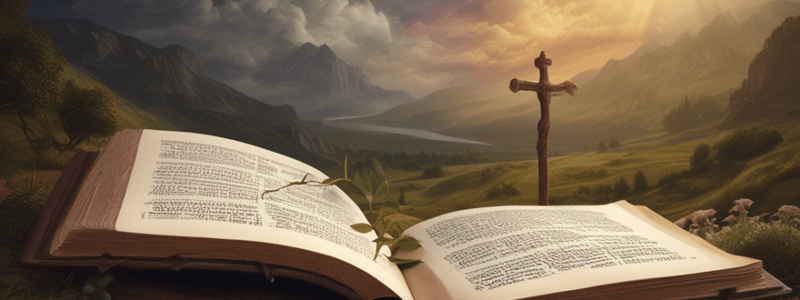Podcast
Questions and Answers
What is the main theme of Psalm 148?
What is the main theme of Psalm 148?
- Praising the second coming of the Lord
- Glorifying St. Mary the mother of God
- Inviting all humanity to praise the Lord
- Inviting nature to praise its Great Creator (correct)
What is the meaning of the Greek word 'psali'?
What is the meaning of the Greek word 'psali'?
- Glorification to St. Mary
- Glorification to the saints
- Hymn to the Holy Spirit
- Praises of the Lord Jesus Christ (correct)
What is the tune of the Psalis used on Wednesday, Thursday, Friday, and Saturday?
What is the tune of the Psalis used on Wednesday, Thursday, Friday, and Saturday?
- Slower tune (correct)
- Faster tune
- No specific tune
- Moderate tune
What is the purpose of Theotokias?
What is the purpose of Theotokias?
How many Theotokias are in the Psalmody book?
How many Theotokias are in the Psalmody book?
What is the Antiphonary (Defnar) in the Psalmody?
What is the Antiphonary (Defnar) in the Psalmody?
What is the final conclusion of the Midnight Psalmody?
What is the final conclusion of the Midnight Psalmody?
What is the result of praising in the Psalmody?
What is the result of praising in the Psalmody?
What is the purpose of the Adam conclusion?
What is the purpose of the Adam conclusion?
What is the result of fixing our eyes on the glories of heaven?
What is the result of fixing our eyes on the glories of heaven?
What is the source of the First Canticle?
What is the source of the First Canticle?
What is the meaning of the Coptic word 'Lobsh'?
What is the meaning of the Coptic word 'Lobsh'?
What is the source of the Second Canticle?
What is the source of the Second Canticle?
What is the refrain of each verse in the Second Canticle?
What is the refrain of each verse in the Second Canticle?
What is the source of the Third Canticle?
What is the source of the Third Canticle?
What is the purpose of the Commemoration of the Saints?
What is the purpose of the Commemoration of the Saints?
What is the meaning of the Greek word 'doxology'?
What is the meaning of the Greek word 'doxology'?
What is the purpose of the doxologies?
What is the purpose of the doxologies?
What is the source of the Fourth Canticle?
What is the source of the Fourth Canticle?
What is the significance of the salvation of the people of Israel from Pharaoh?
What is the significance of the salvation of the people of Israel from Pharaoh?
What is the church described as in the given context?
What is the church described as in the given context?
What is the purpose of praise, according to the given context?
What is the purpose of praise, according to the given context?
What is one of the miraculous abilities of praising, according to the given context?
What is one of the miraculous abilities of praising, according to the given context?
What is the purpose of the Midnight Praises, according to the given context?
What is the purpose of the Midnight Praises, according to the given context?
What is the meaning of the first verse of the Introduction to the Midnight Praises?
What is the meaning of the first verse of the Introduction to the Midnight Praises?
What is the Coptic word for canticle in the Midnight Praises?
What is the Coptic word for canticle in the Midnight Praises?
What is the purpose of the First Canticle in the Midnight Praises?
What is the purpose of the First Canticle in the Midnight Praises?
What is the benefit of praising, according to the given context?
What is the benefit of praising, according to the given context?
What is the relationship between the striving church on earth and the victorious church in heaven?
What is the relationship between the striving church on earth and the victorious church in heaven?
Who participates in the praises with the saints and the angels?
Who participates in the praises with the saints and the angels?
Flashcards are hidden until you start studying
Study Notes
The Church and Praise
- The church is the body of Christ, uniting all members on earth and in heaven.
- Participating in prayers and praises with the saints and angels brings joy in the church.
- Praise is the work of angels, aiming to glorify God without requests.
The Importance of Praise
- Praising is the work of angels and saints in heaven, as described in Psalm 19:1.
- It has the power to change evil habits, sanctify thoughts and senses, and transfer Christian dogma throughout generations.
- Praising is a way to fight the evil spirit and triumph over him.
The Elements of The Midnight Praises
- The Midnight Praises consist of an introduction, four canticles, and other elements.
- The introduction is "Ten Thino", an invitation to praise the Lord, starting quietly and increasing in joyous pitch.
The First Canticle (Hoos)
- The First Canticle comes from Exodus 15, a praise of triumph and defeat.
- It represents the salvation of the Israelites from Pharaoh, symbolizing the salvation of humanity from Satan through the incarnation of Jesus Christ.
Lobsh of the First Canticle
- Lobsh is a Coptic word meaning "explanation", chanted after the first and second canticles.
- On non-Sunday nights, the Gospel according to St. Luke (Luke 2:29) is read after the Lobsh, followed by the 7th, 8th, and 9th parts of the Sunday Theotokia.
The Second Canticle (Hoos)
- The Second Canticle comes from Psalm 135, a praise of joy with salvation and victory.
- It expresses gratitude and thanksgiving to God for His mercy and goodness.
Lobsh of the Second Canticle
- We express our gratitude and thank God for granting us salvation.
The Third Canticle (Hoos)
- The Third Canticle comes from the Continuation of Daniel 3, a deuterocanonical book.
- It represents the salvation of the three young youths from the fiery furnace, symbolizing God's salvation and victory over the devil's temptations.
The Psali of the Three Young Youths (Aripsalin)
- The Psali begins with "O, sing unto Him who was crucified, buried, and resurrected for us".
- It is arranged according to the Greek alphabet and remembers the work of the Lord with the three youths.
The Glorification of the Three Young Youths (Tenoweh Ensok)
- This is a part of the prayer of Azariah, chanted after the Third Canticle and before the Commemoration of the Saints.
The Commemoration of the Saints
- We ask for the intercession and prayer of saints who triumphed over the world, Satan, and his temptations.
- They joined the angels in the life of heaven and help us complete our struggle.
Doxologies
- Doxologies are glorifications of St. Mary, the angels, and the multitudes of saints.
- We give them respect and blessing, seeking their sympathy and aid with their prayers.
The Fourth Canticle (Hoos)
- The Fourth Canticle comes from Psalms 148, 149, and 150.
- It invites nature and humanity to praise and glorify God, participating in the entire universe's praise.
Psali
- Psali is a Greek word meaning "hymn" or "glorification" to Jesus Christ.
- There are two kinds of Psalis: Adam and Batos, used on different days of the week.
Theotokia
- Theotokia is a Greek word meaning "glorifications" of St. Mary the mother of God.
- They come directly after the Psali, glorifying St. Mary and the mystery of incarnation.
Antiphonary (Defnar)
- The Antiphonary is the story of the saint of the day, sung in a hymnal tune.
Conclusion of the Midnight Psalmody
- The conclusion of the praises seeks the mercy of God, saying "O God have mercy on us" and "Lord have mercy" 41 times.
- In the Divine Liturgy, we are united with Jesus Christ in the Eucharist, rejoicing in our partaking of Him.
Studying That Suits You
Use AI to generate personalized quizzes and flashcards to suit your learning preferences.




